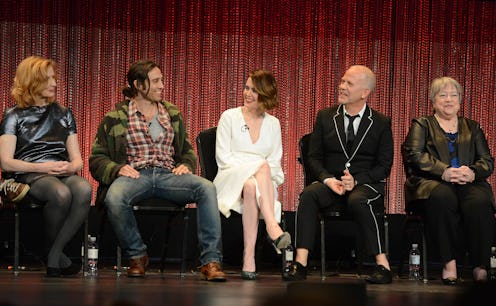Entertainment
Will 'AHS: Freak Show' Be Offensive? We'll See.
Another season of fall TV, another installment of American Horror Story to scare the bejeezus out of you. For the past three years, early in October, Ryan Murphy and Co. have unveiled their newest terrifying ode to creepy dolls, demons, ghosts, and ghouls, and this year is no different. But some people are concerned that Season 4, AHS: Freak Show is more disturbing than the three previous seasons, because AHS: Freak Show's setting (a 1950s carnival) and content (the exploits of said freaks) could become offensive.
It seems that whenever a new film or television show airs a provocative or controversial storyline, two things happen on the Internet: first there are the people who call out the content and explain why they feel it's offensive. Sometimes I agree with them and think their points are valid, sometimes I don't.
Then, there is the second wave of writers, who respond to the initial conversation and complain that these first commentators are being too touchy and are basically getting worked up over nothing. I hardly ever agree with this second group. Because here's the thing: saying that just because you don't find something offensive means it's totally kosher is incredibly narrow-minded and insensitive. I've found that it often comes from a place of privilege, where the person telling others to "just get over it" or "stop being so sensitive" hasn't necessarily been in the position that creates that sort of sensitivity.
Obviously, AHS: Freak Show 's premiere is a ways off. In fact, there isn't even an even an official AHS: Freak Show promo yet (the one that came out in July turned out to be a fan-made trailer). So we can't know for sure if it's going to be offensive or not, or in what ways. Like many Murphy productions (or, let's face it, a lot of TV content in general), there will probably be aspects that are undesirable and aspects that are progressive. Such is the nuance of the brain that brought us Glee, a show that relentlessly bullies its diverse cast to teach viewers to appreciate diversity.
So far, some fans have been concerned that the "freaks" portrayed on the show will actually be people with physical or mental disorders or conditions, and therefore obviously undeserving of such a label. (Of course, no one deserves to be called a freak, but it's a term that has been associated with physical or mental abnormalities, and that's why it's historically more hurtful than being called, say, a dork).
But it really depends on if the actor shares the condition with his or her character, versus an actor mimicking a serious physical condition. Murphy recently announced on Twitter that AHS cast the World's Shortest Woman, Jyoti Amge. Some commenters thought the casting was exploitative.
But that line of thinking seems awfully patronizing. Amge is 20 years old, which means she's a legal adult capable of making her own decision about her career. She's been working as an actress and has already appeared in several reality shows, both in her native India and in the UK. This her career, not a stunt.
Besides, there's a difference between being offended personally (which, to me, rarely seems questionable) and being offended on the behalf of others. Those who are gearing up to take offense at Amge's role before AHS: Freak Show premiers may think that they're protecting the actress, or fighting for her rights. But this view completely misses the point that Amge signed on to this show voluntarily. She obviously felt comfortable with the material, and there's been nothing to indicate that she feels exploited. What is worrisome is the mindset that Amge couldn't possibly have made the decision on her own to take on this part, or that she doesn't recognize the exploitation she's being "subjected to."
There are many criticisms to be made of Murphy (believe me, I'm happy to make some), but he is one of the very few showrunners ever to continually cast actors with disabilities — in particular, Down's Syndrome — as fully formed, highly individual characters. Again, these are actors who clearly want to play the roles he writes for them (otherwise, they wouldn't keep working with him). Two of the three actors Entertainment Weekly profiled for a 2012 story about actors with Down's worked on Murphy projects: Lauren Potter as Becky on Glee and Jamie Brewer in two different iterations of American Horror Story. As the magazine pointed out, before that year, there hadn't been a major character with Down's on TV since 1993.
All of this is to say, Murphy has been able to cast differently-abled people in the past, and to treat them with dignity. Who's to say that AHS: Freak Show will be any different? For now we'll just have to wait until the season premiere on October 8 to find out. Although, if you're like me, you'll be way to terrified to be offended.
Images: Blingee; TeeVeeGetsMe/Tumblr; ILikeHimHeSaysOkieDokie/Tumblr; GleeWikia
